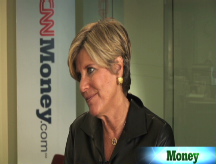If you knew Suze Orman...
You may think you already know everything the queen of mass-market money advice has to say. You would be wrong.
 |
| "if more people did what I do and tried to keep people out of debt, the global economy wouldn't be in the mess it's in." |
| MMA | 0.69% |
| $10K MMA | 0.42% |
| 6 month CD | 0.94% |
| 1 yr CD | 1.49% |
| 5 yr CD | 1.93% |
(Money Magazine) -- To spend time in public with Suze Orman is to see how famished Americans are for financial advice they trust - and how much they trust Suze. In the 150-foot walk from Money's offices to the elevator, Orman leaves a wake of FedEx couriers, passers-by and office workers thanking her for helping them right their money lives. "You'd have thought Bono was here," marvels one editor.
Sure, some people have a hard time seeing beyond her steamroller stage presence, but that's unfair. She possesses an encyclopedic command of financial planning and her advice is always clear and generally unimpeachable.
And Orman has been on a roll lately: When managing editor Eric Schurenberg caught up with her, "Women and Money," her ninth personal-finance book, had hit No. 1 on the New York Times business bestseller list, and Time magazine had just named Orman one of the world's 100 most influential people.
Q. You used to be a big fan of index funds. Now you're not.
A. I know, I know. I'm switching for the first time in my life. All the stats say that index funds outperform 80% of managed funds out there. And a few years ago I'd have said just buy Vanguard's S&P 500 index fund (VFINX) or its Total Stock Market index fund (VTSMX).
But today I think you have to be more active, and I like exchange-traded funds that let you own particular sectors, like iShares MSCI Emerging Markets (EEM), United States Oil Fund (USO) or the Metals & Mining SPDR (XME).
Q. Oil and mining? You obviously aren't worried that commodities are the next bubble.
A. No. I think it's absolutely possible you could see oil go to $150 or $160. I'd never tell you to put 100% of your money into anything. But I think in this economy you need to manage your money more actively.
Q. I'm surprised you don't like target-date retirement funds, which I've always thought of as a simple solution for people who want to leave the investing to a pro.
A. Target funds automatically take money out of your stock funds and add it to bond funds just because you're getting older. Give me a break! You should invest in bonds only when interest rates are going down. But target funds base all their decisions on one factor: your age.
Q. Variable annuities.
A. I hate them with a passion - a passion! - especially in a retirement account like an IRA. Variable annuities have all these extra fees and tax issues and penalties, but - oh, that's okay! - because they give you a tax deferral. But a retirement account is already tax-deferred without all those fees. It's absolutely ridiculous. I think variable annuities exist for one reason only: to make money for the financial advisers who sell them.
Q. All right then: How do you find an adviser you can trust?
A. The best ones tell you right up front how they make their money, and they'll ask you something besides "How much do you have to invest?" Want to find a good adviser? Go into his office and tell him you have $25,000 in credit-card debt. See how he responds. A good one will say, "Let's set up a plan to get you out of debt and only then, when you're out of debt, will we put you into some good investments." That's how you'll know if they want to help you or only make money off you.
Q. Some critics say all you do is give not-very-smart people not-very-original advice about getting out of debt.
A. I have to laugh to myself when I read things like that. The credit crisis has now dramatically affected the world economy. All of a sudden the actions of the little people matter. If more people had been doing what I do, if we'd cared enough to keep little people out of debt they couldn't handle, the global economy wouldn't be in the mess it's in. So while some may think it's a trite topic Ms. Orman deals with, it has brought down mortgage companies, brokerage firms and everything else. I think people who attack me don't know how much they don't know about making personal financial decisions. If they did, they'd understand the depth of what I do. ![]()



